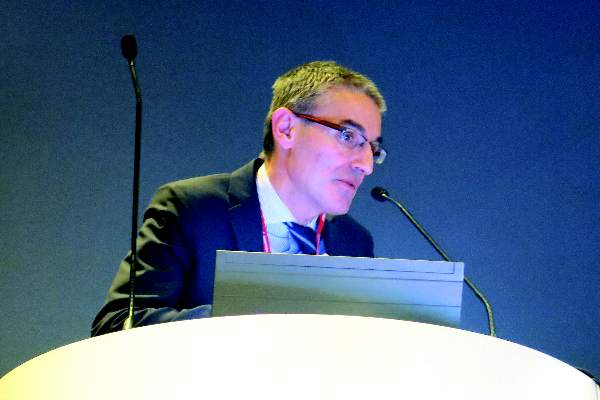User login
CHICAGO – Biologic prostheses in patients with severe ischemic mitral regurgitation undergoing mitral valve replacement were associated with worse valve hemodynamics and decreased functional capacity, compared with mechanical prostheses, long-term follow-up data showed.
Dr. Carlo Fino reported the results of a retrospective study involving 86 consecutive patients who received mitral valve replacement with either biologic (41) or mechanical (45) prostheses for chronic ischemic mitral valve regurgitation. Their mean age was 63 years and 60 were male.
Significantly more patients with mechanical bioprostheses had a history of heart failure (53% vs. 27%), but all other baseline demographic, clinical, and echocardiographic data were similar. Patients with atrial fibrillation were excluded from the study.
Operative variables were also similar between the mechanical and biologic groups including cardiopulmonary bypass time (mean, 85 vs. 82 minutes), aortic cross clamp time (mean, 71 vs. 68 minutes), arterial grafts per patient (1.2 for both groups), anastomoses per patient (2.7 vs. 2.4), and use of intra-aortic balloon pump (2 patients vs. 1 patient).
At 32 months’ follow-up, patients with mechanical versus biologic prostheses had significantly higher left ventricular ejection fraction (49% vs. 42%) and cardiac index (4.8 vs. 4.5 L/min per square meter) during exercise, Dr. Fino reported at the American Heart Association scientific sessions.
Systolic pulmonary arterial pressure increased modestly during exercise with a mechanical valve, but was significantly higher with a biologic valve (41 vs. 59 mm Hg), as was mitral peak gradient (11.26 vs. 16 mm Hg).
An interesting finding in the study was that effective orifice area and indexed effective orifice area both increased significantly during exercise with a mechanical prosthesis, but did not increase at all with a biologic prosthesis (2.2 vs. 1.8 cm2; 1.57 vs. 1.18 cm2/m2, respectively), said Dr. Fino of Azienda Ospedaliera Papa Giovanni XXIII, in Bergamo, Italy.
“We can’t explain why this effective area does not increase with the bioprosthesis,” he said.
The findings have not changed the center’s clinical approach, but warrant bigger, longer confirmatory studies, he said.
Dr. Fino and his coauthors reported having no relevant financial disclosures.
CHICAGO – Biologic prostheses in patients with severe ischemic mitral regurgitation undergoing mitral valve replacement were associated with worse valve hemodynamics and decreased functional capacity, compared with mechanical prostheses, long-term follow-up data showed.
Dr. Carlo Fino reported the results of a retrospective study involving 86 consecutive patients who received mitral valve replacement with either biologic (41) or mechanical (45) prostheses for chronic ischemic mitral valve regurgitation. Their mean age was 63 years and 60 were male.
Significantly more patients with mechanical bioprostheses had a history of heart failure (53% vs. 27%), but all other baseline demographic, clinical, and echocardiographic data were similar. Patients with atrial fibrillation were excluded from the study.
Operative variables were also similar between the mechanical and biologic groups including cardiopulmonary bypass time (mean, 85 vs. 82 minutes), aortic cross clamp time (mean, 71 vs. 68 minutes), arterial grafts per patient (1.2 for both groups), anastomoses per patient (2.7 vs. 2.4), and use of intra-aortic balloon pump (2 patients vs. 1 patient).
At 32 months’ follow-up, patients with mechanical versus biologic prostheses had significantly higher left ventricular ejection fraction (49% vs. 42%) and cardiac index (4.8 vs. 4.5 L/min per square meter) during exercise, Dr. Fino reported at the American Heart Association scientific sessions.
Systolic pulmonary arterial pressure increased modestly during exercise with a mechanical valve, but was significantly higher with a biologic valve (41 vs. 59 mm Hg), as was mitral peak gradient (11.26 vs. 16 mm Hg).
An interesting finding in the study was that effective orifice area and indexed effective orifice area both increased significantly during exercise with a mechanical prosthesis, but did not increase at all with a biologic prosthesis (2.2 vs. 1.8 cm2; 1.57 vs. 1.18 cm2/m2, respectively), said Dr. Fino of Azienda Ospedaliera Papa Giovanni XXIII, in Bergamo, Italy.
“We can’t explain why this effective area does not increase with the bioprosthesis,” he said.
The findings have not changed the center’s clinical approach, but warrant bigger, longer confirmatory studies, he said.
Dr. Fino and his coauthors reported having no relevant financial disclosures.
CHICAGO – Biologic prostheses in patients with severe ischemic mitral regurgitation undergoing mitral valve replacement were associated with worse valve hemodynamics and decreased functional capacity, compared with mechanical prostheses, long-term follow-up data showed.
Dr. Carlo Fino reported the results of a retrospective study involving 86 consecutive patients who received mitral valve replacement with either biologic (41) or mechanical (45) prostheses for chronic ischemic mitral valve regurgitation. Their mean age was 63 years and 60 were male.
Significantly more patients with mechanical bioprostheses had a history of heart failure (53% vs. 27%), but all other baseline demographic, clinical, and echocardiographic data were similar. Patients with atrial fibrillation were excluded from the study.
Operative variables were also similar between the mechanical and biologic groups including cardiopulmonary bypass time (mean, 85 vs. 82 minutes), aortic cross clamp time (mean, 71 vs. 68 minutes), arterial grafts per patient (1.2 for both groups), anastomoses per patient (2.7 vs. 2.4), and use of intra-aortic balloon pump (2 patients vs. 1 patient).
At 32 months’ follow-up, patients with mechanical versus biologic prostheses had significantly higher left ventricular ejection fraction (49% vs. 42%) and cardiac index (4.8 vs. 4.5 L/min per square meter) during exercise, Dr. Fino reported at the American Heart Association scientific sessions.
Systolic pulmonary arterial pressure increased modestly during exercise with a mechanical valve, but was significantly higher with a biologic valve (41 vs. 59 mm Hg), as was mitral peak gradient (11.26 vs. 16 mm Hg).
An interesting finding in the study was that effective orifice area and indexed effective orifice area both increased significantly during exercise with a mechanical prosthesis, but did not increase at all with a biologic prosthesis (2.2 vs. 1.8 cm2; 1.57 vs. 1.18 cm2/m2, respectively), said Dr. Fino of Azienda Ospedaliera Papa Giovanni XXIII, in Bergamo, Italy.
“We can’t explain why this effective area does not increase with the bioprosthesis,” he said.
The findings have not changed the center’s clinical approach, but warrant bigger, longer confirmatory studies, he said.
Dr. Fino and his coauthors reported having no relevant financial disclosures.
AT THE AHA SCIENTIFIC SESSIONS
Key clinical point: Patients with severe mitral valve regurgitation implanted with a mechanical prosthesis appear to have better cardiovascular performance in the long term than those given biologic prostheses.
Major finding: Indexed effective orifice area increased significantly during exercise with a mechanical prosthesis versus a biologic one (1.57 vs. 1.18 cm2/m2).
Data source: A retrospective study in 86 consecutive patients undergoing mitral valve replacement for severe ischemic mitral regurgitation.
Disclosures: Dr. Fino and his coauthors reported having no relevant financial disclosures.

